It’s all a bit confusing, isn’t it?
Trying to keep up with the latest information on what is, or isn’t, the best way to prepare our food is a perplexing subject.
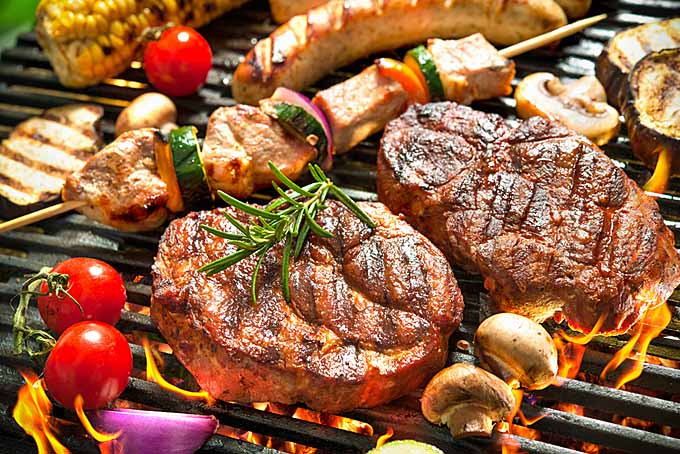
One day we’re told Method X is the best cooking technique for nutritional value and good health, and the next we see a headline telling us it’s linked to cancer.
Take grilling, for example. For years, health and nutrition experts have espoused grilling as the cleanest and leanest cooking process – fat drips away from the food as it cooks, and there’s no extra calories in the form of batters, heavy sauces or excess oils.
Then, over the last decade or so, information started to trickle in about purported health risks of grilling.
Well, good news for all who enjoy outdoor cooking American barbecue style – grilling itself is not actually bad for us.
However, certain processes that occur when grilling may be hazardous to our health, particularly with meats cooked over high heat on charcoal barbecue grills.
So, let’s dig a little deeper and find the bottom line on grilling and health concerns, and then look into how to mitigate those concerns with some easy solutions.
We’ll close with a couple of marinade recipes for the barbecue, as marinating is one of the best ways to keep grilling healthily and to have fun all summer long.
The Charred Meat Problem
Like many others, you’ve probably heard that grilling may lead to an increase in the risk of getting particular cancers.
And that’s something to be concerned about, because let’s face it – it’s pretty easy to let a bit of charring happen on the BBQ. Whether you are using a gas or charcoal grill, this can be a problem.
And there are those who prefer their grilled food with a bit of a char on it, whether this is intentional or not.
So, what is it about charred meat that’s causing so much concern? It turns out that cooking red meat, poultry, pork or fish directly over a flame or at high temperatures causes the muscle proteins to react with the heat – and forms compounds known as HCAs (or heterocyclic amines).
These HCAs are mutagenic, meaning they have been shown to cause destructive DNA changes in cell structures that may lead to certain cancers.
Not only that, but as the high heat releases fat from the meat, it drips down onto the coals or burners and then ignites, producing smoke – which also contain carcinogenic chemicals called PAHs (or polycyclic aromatic hydrocarbons).
As the smoke from the fat rises, it swirls over the food and deposits these chemicals onto that mouth-watering, sizzling half rack of baby back ribs that has your name on it.
Unfortunately, numerous studies since the 80s have shown increasing evidence to link the consumption of grilled red meat to an increased risk for colon, prostate, pancreatic, stomach, and breast cancers – and this increased risk is especially prevalent if the meat is well done.
In some studies, the increased risk was as much as 60% – and that’s a lot.
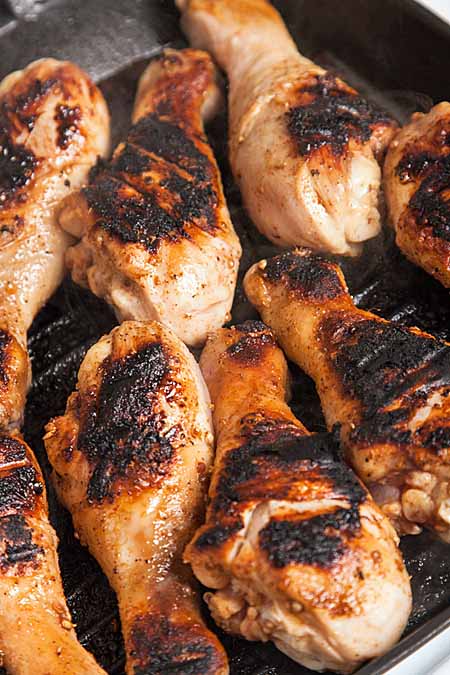
And then there’s the nature of some of the meats that get grilled. Favorites for an outdoor cookout on the portable charcoal barbecue grill – such as meats like hot dogs, pre-packaged hamburgers and sausages – come with their own cancer concerns in the guise of nitrates and nitrites.
When added to cured meats, these nitrates and nitrites preserve the food to ensure a longer shelf life, but they come with their own host of health concerns. These are further compounded when the preserved meats are cooked over high heat, as the nitrites can transform into nitrosamines – another carcinogen.
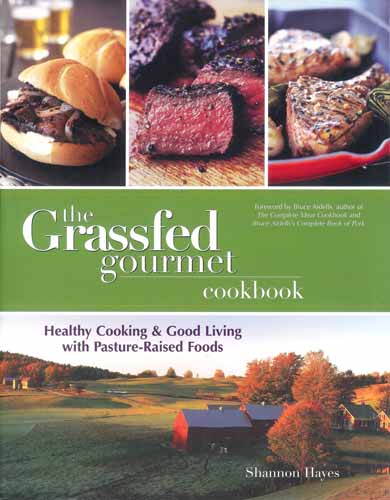
Foodal recommends The Grassfed Gourmet Cookbook: Healthy Cooking & Good Living with Pasture Raised Foods
So, it seems that we have fair reason to reconsider our grilling practices. But, isn’t there a way to reduce these risks and still enjoy our favorite summertime cooking style?
As it turns out, there is.
You can relax BBQ aficionados, because the health researchers say we don’t have to give up the grill permanently.
It’s still a clean and lean way to cook if you follow a few common sense grilling safety tips, and moderate your temperatures. Let’s explore these safety tips in detail.
Some Solutions
There are several ways to reduce the potential health risks of grilling so you can continue to enjoy barbecue season.
1. Go Lean
Always start with a lean cut of meat. Trim off any excess visible fat, and remove skin from poultry before grilling. This keeps grilling a lean and healthy choice for clean cooking, and also limits fat drip flare-ups that can char the meat.
2. Marinate
Marinating meats before grilling is one of the best ways to reduce the formation of HCAs, by as much as 96% according to the American Institute for Cancer Research.
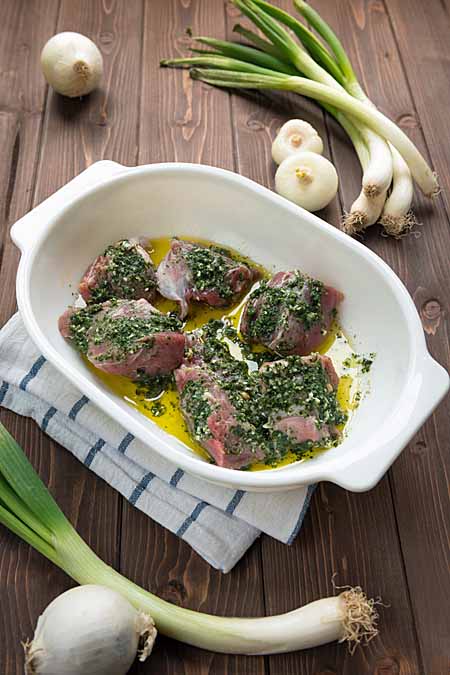
And while research isn’t exactly clear about why a marinade is so effective, whether it forms a protective barrier or the protection is in the combination of ingredients, the results speak for themselves.
Not only will a marinade perform this mighty health-promoting task, it will also imbue meats with delicious flavor, add moisture, and tenderize tougher cuts.
Marinades require four things to be effective. They are:
- An acid for enzyme action to tenderize meat – found in lemon and lime juice, apple juice, wine, yogurt, buttermilk and vinegars.
- Pungent herbs and spices for flavor.
- A drop of oil to add moisture.
- Enough time to let the process work.
Many ingredients suitable for marinades are loaded with flavonoids, which may help to reduce the formation of carcinogens.
Try liquids such as olive oil, canola oil, lemon and lime juice, low-sodium soy sauce, honey, beer, wine, apple juice, buttermilk, Worcestershire sauce and yogurt.
Add flavoring to meat marinades with herbs, spices and aromatics such as thyme, oregano, mint, sage, savory, garlic, onion, ginger and rosemary, which may also contribute to a reduction in the formation of HCAs.
For marinating, keep these tips in mind:
- Whether you make your own or purchase a bottled marinade, look for recipes or products that contain only small amounts of healthy oils, such as olive or canola.
- Refrigerate any foods that will be marinated for more than 30 minutes, to prevent the formation of bacteria.
- Set aside a small amount of the marinade for basting while grilling – don’t use the same liquid the meat was marinating in, as you don’t want the raw meat juices to be added to your cooked food.
- Most commercial meats like beef, pork and poultry should marinate for at least 1-2 hours, while fish and veggies require only 30-60 minutes.
- Add a dry rub. A dry spice mix made with ingredients like turmeric, garlic and rosemary has been shown to cut down the production of HCA by as much as 70%.
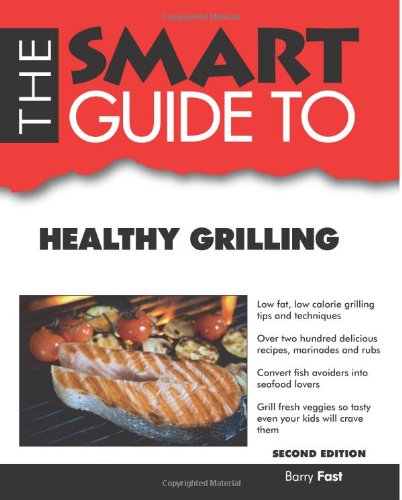
Foodal recommends Barry Fast’s The Smart Guide to Healthy Grilling
Tangy Meat Marinade
This marinade is rich in antioxidants and polyphenols found in wine (or beer), herbs and garlic. Allow ½ cup of marinade for each pound of meat.
- 1/2 cup red wine
- 1/4 cup olive oil
- Zest and juice from ½ lemon
- 1/4 cup Worcestershire sauce
- 1/4 teaspoon hot pepper sauce
- 1 teaspoon ground white pepper
- 1/2 teaspoon sea salt
- 2 teaspoons garlic powder
- 2 cloves garlic crushed
- 3 tablespoons fresh basil shredded
- 2 tablespoons fresh parsley chopped
- Add the red wine, olive oil, lemon juice, Worcestershire sauce, hot pepper sauce, garlic powder, garlic, basil, parsley, salt and pepper to a blender. Blend on high speed for 30 seconds or so, until thoroughly mixed.
- Place meat in a shallow dish, pour marinade over the meat, cover, and refrigerate for at least two hours and up to eight, turning the meat occasionally while marinating. Cook meat as desired.
* Beer makes a good substitute for red wine.
** Use oil sparingly to prevent oil flare-ups on the grill.
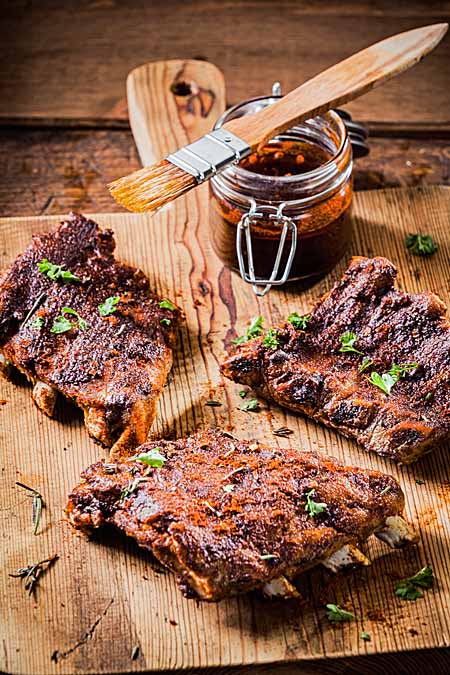
Saucy Citrus and Herb Marinade for Poultry and Fish
This citrus and herb marinade works equally well on fish or chicken for the grill. Ensure that all pieces are covered completely to soak up the goodness.
- Juice and zest of 2 limes
- Juice and zest of 2 lemons
- 1/2 cup olive oil
- 5 sprigs fresh rosemary minced
- 5 sprigs fresh sage minced
- 3 sprigs fresh parsley minced
- 3 cloves garlic smashed and minced
- 1/2 teaspoon crushed red chili pepper
- 1/2 teaspoon sea salt
- 1/2 teaspoon fresh ground black pepper
- In a jar with a tight-fitting lid, combine the juice and zest of the lemons and limes, the minced herbs, garlic, crushed red chili pepper and olive oil. Shake will to combine and emulsify.
- Place the chicken or fish in a wide shallow dish in a single layer. Add the herb mixture, cover and refrigerate for at least one hour. Cook poultry or fish as desired.
* This recipe includes a lot of zested citrus. It helps to have a good tool to scrape the peels. Check out our guide to help you find a good one.
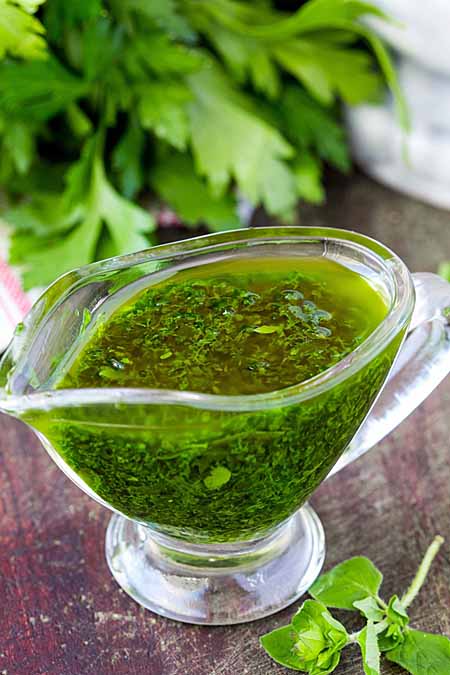
3. Grill More Veggies and Fruit
Eating more antioxidant rich fruits and vegetables is a great habit to get into, and they grill up very well. But the best news is, HCAs and PAHs don’t form on grilled fruits and vegetables – so, grill them on their own or with meat, fish or poultry to enjoy their many health benefits!
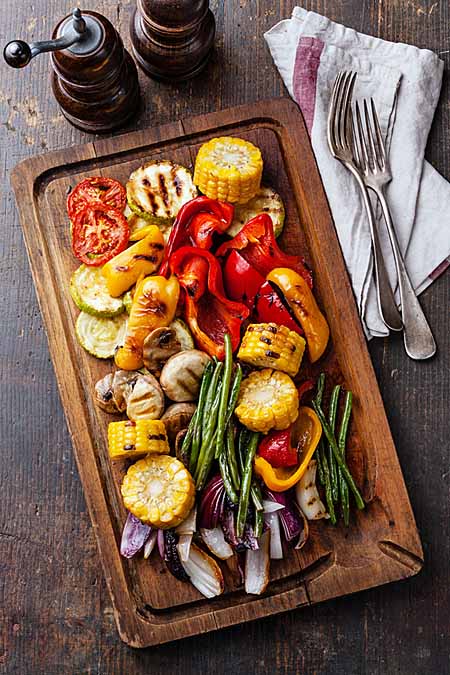
Some veggies and fruits that are great for the grill are:
Grilled veggie dishes are healthy and savory, such as this grilled veggie salad recipe with raw spinach and parsley dressing.
And don’t forget veggie burgers are an option, too! Skip the frozen stuff, and try making your own at home. You’ll love this recipe for Sweet Potato Coconut Patties if you’re looking for something a little different.
4. Reduce Heat with Smaller Portions
As cooking meat at high temperatures is one of the triggers for the formation of the compounds we don’t want, we can further reduce the risks by cooking on low.
Grill meat at lower temperatures (325°F and under), and cook smaller portions to reduce time on the grill – perfect advice for those using portable gas BBQ grills that may not have a high BTU output.
Smaller portions will cook faster and spend less time on the grill under unfavorable conditions.
5. Become a Kebab King
Another easy way to cut down on the time your food spends on the grill is to thread bite-sized chunks of meat, poultry, fish and seafood on a skewer and grill up some kebabs.
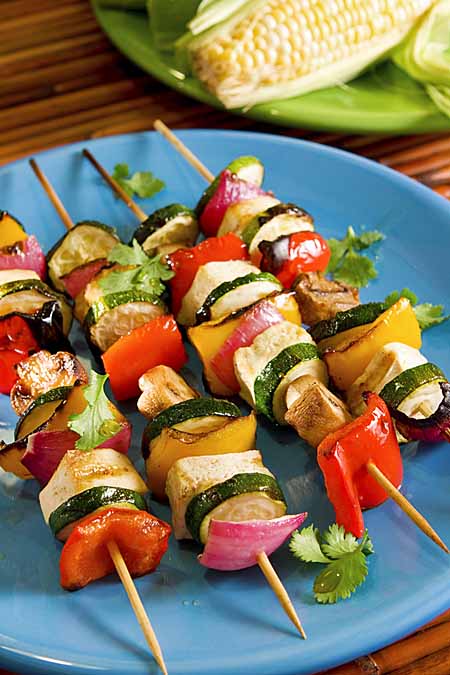
Most folks like to alternate with pieces of bell peppers, onion, zucchini, cherry or plum tomatoes, and mushrooms for a tasty treat.
However, there is a better way:
Cook the meat separately from the vegetables (and fruit). This allows both food types to cook under the ideal heat and time. Try a little direct heat followed by a lower temperature for the meat, and significantly lower temperatures for the vegetables.
Use (pre-soaked) bamboo or metal skewers, or strip rosemary sprigs of their needles and use the stems for an extra flavor boost.
6. Flip, Don’t Fork
Anther technique that may seem a bit counterintuitive to our usual grilling practices is to flip food on the grill often. According to information compiled by the National Cancer Institute (2), this will help prevent the formation of HCAs.
Turn the meat with a spatula rather than a fork, as piercing the meat will release juices that may drip and smoke, contributing to FCA production.
7. Eat More Chicken and Fish
The American Heart Association urges us to eat more fish for their healthy and disease preventing omega-3 fatty acids, and poultry for its leaner protein.
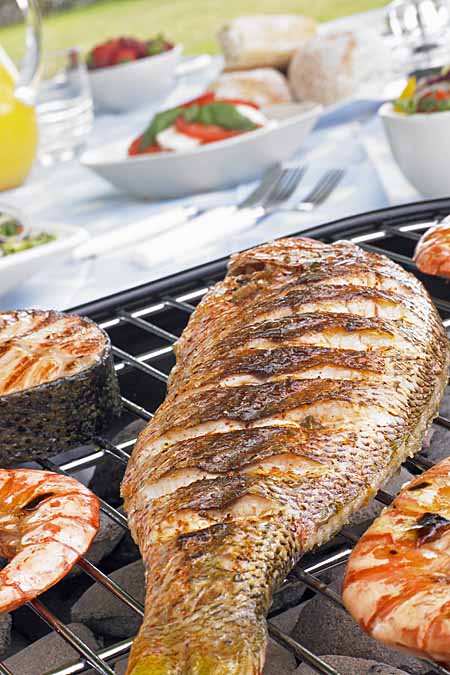
For something a bit different, make burgers out of ground chicken, turkey or salmon with tangy herbs and aromatics. You’ll love this healthful alternative to red meat burgers.
8. Eliminate the Nitrates
When grilling hot dogs, sausages or pre-packaged hamburgers, look for natural foods free of additional nitrates and preservatives. They might make meat last longer on the grocery store shelf, but they don’t do our physical health any good.
9. Precook Meat
Another trick is to precook meat in the microwave, then finish it on the grill (1). Doing so separates the juice from the meat, and this may remove any water-soluble HCA precursors from forming. Unfortunately, this also removes most of the flavor from the meat as well…
10. Keep it Clean
Regularly clean and remove any bits of charred food from the grate and firebox of your grill to prevent the formation of FCAs through secondary smoke.
Grilling Safety
And while we’re on the subject of grilling safety, let’s look at another issue to ensure our continued barbecuing pleasure. Overcooking isn’t the only part of outdoor grilling that can be hazardous to health – food poisoning is another.
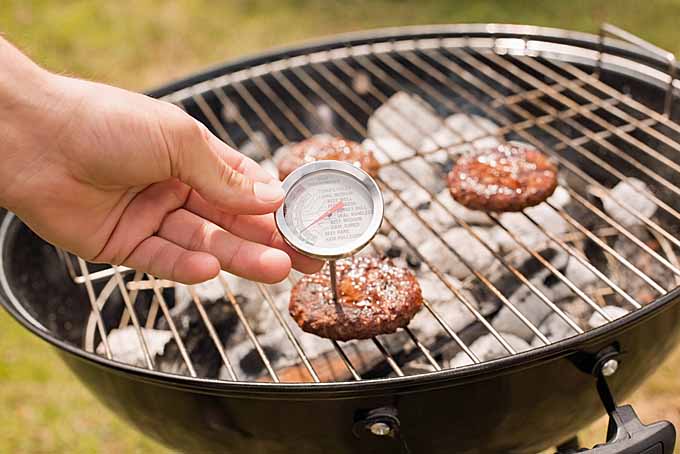
Undercooked meat, improperly prepared meat, and cross-contamination can all lead to a nasty case of food poisoning, and it happens every summer; millions of people are diagnosed with mild to severe cases of food poisoning.
Most often, the culprit is from eating undercooked meat and poultry, or from cross-contamination of foods. Bacteria heavy hitters such as E. coli and salmonella are regular visitors to chicken, beef and meat products.
If the meat isn’t cooked to a certain internal temperature, the bacteria remain vital and can end up your intestinal tract – with symptoms like vomiting, excessive sweating, stomach cramps and diarrhea as a result.
To keep your cookout fun and healthy, follow these tips for safe food handling:
- Chill out. Store all meat and poultry in the fridge until it’s ready to go on the grill. And refrigerate any leftovers within 30 minutes to prevent bacteria from forming on the surface.
- Separate food groups. In order to avoid bacterial cross-contamination, keep raw meats, burgers, chicken and fish away from salads, vegetables, fruits or any other foods that will be consumed without cooking.
- After cutting or handling raw meat, wash all utensils, dishes and the cutting board with hot, soapy water. And always use a clean plate for serving, not the one the raw meat was on.
- Clean up. Before handling any food items, wash hands with warm water and soap for at least 20 seconds.
- Keep food covered. Any food that’s prepped and waiting for the grill should be covered to keep bugs, and the germs on their little bug feet, off of your food – you don’t know where they’ve been, and they probably didn’t wash before landing on your meal.
Additionally, you want to cook you meat thoroughly.
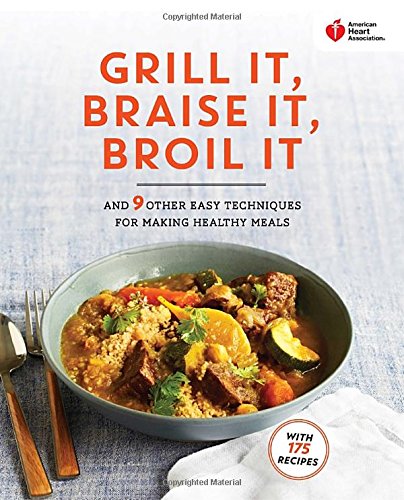
Foodal recommends American Heart Association Grill It, Braise It, Broil It: And 9 Other Easy Techniques for Making Healthy Meals
The outside appearance of a burger is not a good indicator of whether or not it’s done. Use a food thermometer inserted into the thickest part of the meat until it reaches the optimal temperature, as outlined by the Food Safety and Inspection Service:
- Whole chicken or turkey: 165°F
- Chicken or turkey breasts (boneless): 165°F
- Ground chicken or turkey: 165°F
- Hamburgers, ground beef: 160°F
- Beef roasts or steaks: Medium rare 145°F; Medium 160°F; Well-done 170°F
- Pork: 160°F
- Fish: 145°F
You can also check out Foodal’s Guide to Roasting Times for Various Types of Meat for additional tips.
These grilling tips and advice from the health experts should become an important part of our toolkit of barbecuing essentials – to keep grilling safe and delicious all summer long.
Now you’re ready to try these recipes for tasty and healthy marinades yourself, to keep the grill fires burning!
About Lorna Kring
Recently retired as a costume specialist in the TV and film industry, Lorna now enjoys blogging on contemporary lifestyle themes. A bit daft about the garden, she’s particularly obsessed with organic tomatoes and herbs, and delights in breaking bread with family and friends.



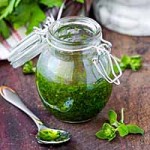
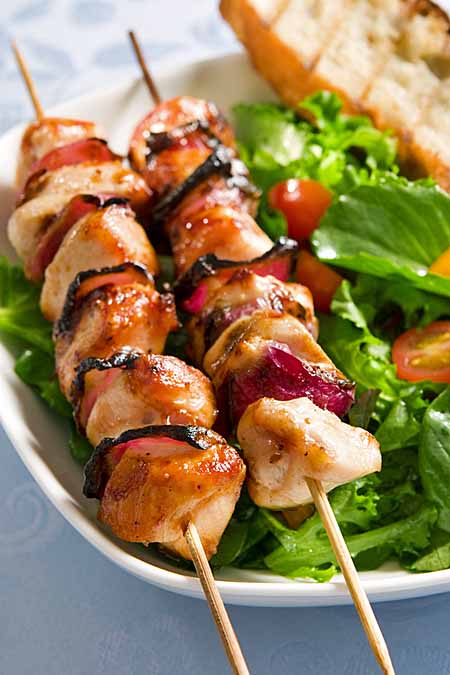
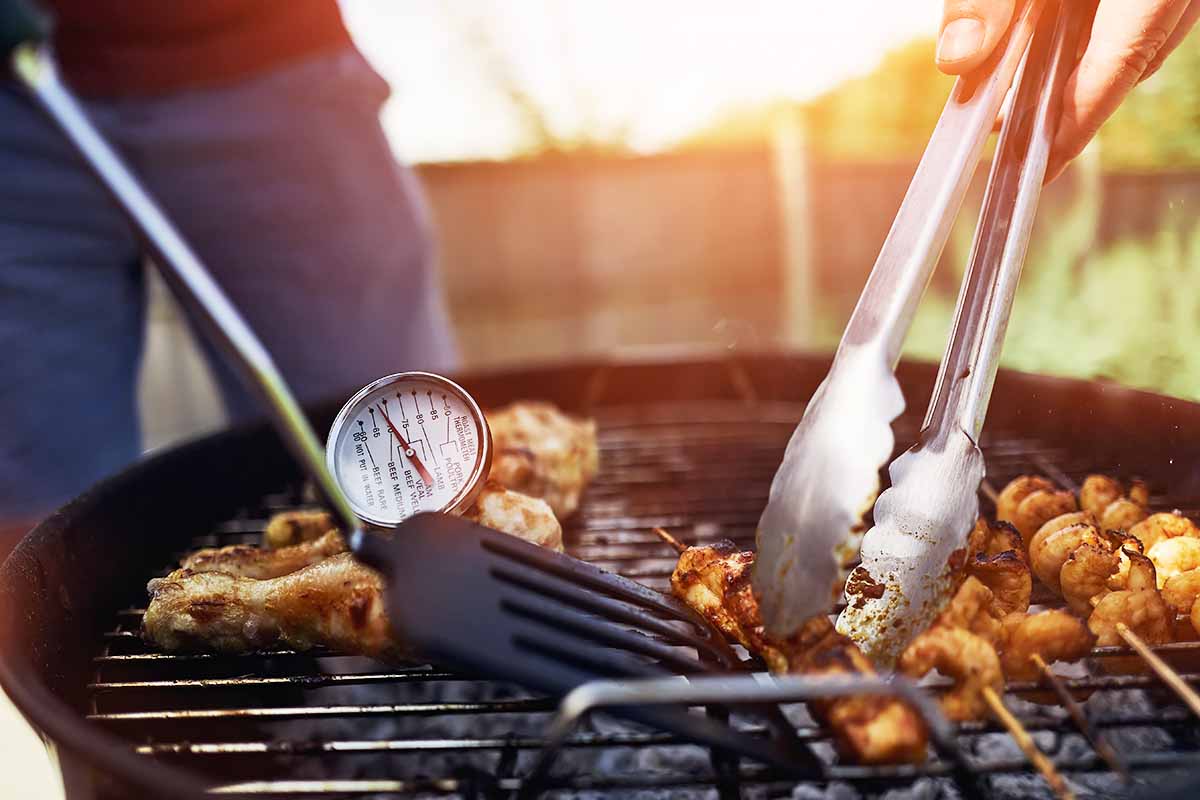


This article is chock full of great advice. I wasn’t aware of the health benefits of dry rubs and marinades, I thought they were simply used to add flavor to foods. As cancer runs in my family, I will do whatever it takes to decrease my exposure to toxins, so I’ll be taking this advice to heart when I barbecue in the future.
Glad you found it useful Diane, there’s a lot we can do to minimize our risks – and still enjoy cooking over an open flame.
What a nice well documented article! I’d heard that charred meat from BBQs had more carcinogens, but it’s very pleasant to get more details about that (and about how to avoid it!). Also pretty cool that veggies and fruits don’t get this! What about tofu and bean burgers? I mean, I’ve yet to get to a bean burger that stood a chance to keep in one piece on the grill, but one can still get curious…!
Thanks crayonelle, glad you found it informative. Tofu and bean burgers fall in the veggie category, and so are naturally safe for the grill being animal fat free… try a veggie grilling rack to hold your bean burgers in place.
I feel so uninformed, I wasn’t really aware of any of this. Maybe because it’s been so long since I last grilled anything. In any case, this is all great info to know. And it’s especially good to know this doesn’t affect fruits and veggies. Will have to bookmark this for reference, some of my friends still grill pretty often and they might like to know.
Glad you found the info useful Leopard, and it is nice to know that fruits and veggies are safe on the grill.
I admit it–I looked at this title and said, “Well, it’s certainly the tastiest.” I’m guilty of always grilling my steaks, shrimp, hot dogs, and chicken. This article not only gave me the insight that I need on the scientific reasoning behind the unhealthiness of grilling (which I had actually originally become interested in after I heard about the triclosan scare in Colgate toothpaste), but also healthier foods to grill. Thankfully, I love making kabobs as I’m half-Arab, and so your tip on cooking the vegetable and meats separately was extremely helpful.
Oh, yes, those little charred tips around the edges are yummy… but, so’s my good health. Glad you found the post helpful Liv6.
How about smoked fish such as salmon?
The tips found in this article are certainly ” food” for thought. I thought marinating meat was just meant to give it more flavor. I know some people like their meat a bit charred but I don’t like it.
Food for though indeed… I think the original intention of marinades was for flavor and tenderizing, they just happen to be very health friendly too!
Aww, man! I love that slightly charred taste on my burgers after a long day of running around and enjoying the sunshine. Thank you for the informative article! I had no idea that was the reason for all the warnings I’ve heard.
I especially loved the breakdown about marinades and the four pieces necessary to help make a marinade most effective. I have always used an acidic base when making a marinade, but now I know that I’ve been doing right without realizing it!
I know, it’s a bummer about those crunchy, charred tips… glad you found the post useful Bonbinski.
Loving the awesome advice and recipes in this article! I had no idea that there was any sort of problem with charred meat in the first place, let alone links to cancer. Yikes! I guess I’ll have to put my days of deliciously charred burgers into the past.
I’ll have to be more careful about that. And it is great to know that marinating doesn’t just make food taste amazing. And I have to admit, I’ve never actually tried veggies done on the grill. That image of the grilled veggies looks delicious though and makes me want to give it a try. I was planning on bringing out the grill tomorrow for some grilled chicken, and I think I just might have to add some asparagus and carrots in there too!
Delicious article, thanks for all of this!
Thanks for your comments nightwind, glad you found some tips for healthy, tasty grilling!
As someone who loves sightly charred meat in a grill, the carcinogenic aspects are a little worrying. I don’t have food like this often though, so maybe I’ll be okay? I hope xP
Well, the less the better. But really, now that you know about the cancerous connection, you’ll never be able tofully enjoy the char quite the same way again…. might as well give it up altogether!
Thank you, thank you, thank you for NOT breaking my heart just days before the 4th of July. I found myself getting nervous until I read the ways to prevent those issues. Luckily for me, I don’t usually love fatty cuts of meat, nor do I particularly like my meat well done. To me, it tastes as though it has lost all of it’s flavor. I was surprised to see such a high percentage associated with marinating; I do wish that I knew the science behind that. The only thing that I will have to work on is cutting back on the “blackened” effect. I can’t turn down a nice charred piece of protein…or grilled pizza…or hotdogs (which you’re telling me is a double whammy? sigh). I’m thinking of trying out that Tangy Meat Marinade this weekend. Thanks for the tips and recipes!
The good news is we don’t have to deprive ourselves of grilling at all … we just need to be a bit more selective and attentive when cooking over an open flame to ensure we can continue to enjoy great summer BBQ’s.
I’m not too happy about the charred part. I love my meat to have a blackened texture. I just love the taste of it. However, I had no clue this was being linked to cancer! My gosh. It makes me sad I’ll have to stop charring my meat.
Thank you for the advice and awareness. I’ll bookmark this for the tips. Especially with it being the summer it is definitely useful.
I wasn’t too happy about it either denelizr, but we do what we can to look after ourselves… glad you found the post useful.
Thankfully, I’ve never been a fan of burnt ends etc so will continue to enjoy my barbecue. Virtually every type of food or preparation method ends up being labelled as carcinogenic at some point and it’s often difficult to know what to believe.
Thanks for your comments mb, and enjoy BBQ season!
My older siblings LOVE to char their meats. I’ll have to share this with them. I have always grilled my meat only just so, and I frequently use my grill to cook vegetables. Guess I’m ahead of the curve!
Way ahead of the curve B, and nice you’re looking out for your siblings…
I do not think if grilling is the healthiest way of cooking because of various reasons. The main one is that grills may get contaminated easily since they are exposed to the environment. Bacteria might develop on grills unknowingly and this puts the health of those who are going to consume the food at risk.
Well I would think that the heat takes care of a lot of that, but on the whole I think you are right, it is not the cleanest option out there. That said, though, it just tastes better so I am personally willing to sacrifice a little bit of that for some flavor. I would bet that steaming is probably the healthiest, although you cannot do that with meat, at least I do not think so.
Bacteria can certainly form on the surface of a grill, as it can on any cooking surface. But, as the temperature required to cook meat, fish, poultry or vegetables is hotter than is needed to kill surface bacteria, it’s a pretty safe bet in that regard.
Pre-heating the grate to a minimum temp. 250F will do the trick. Good point, thanks for bringing it up.
I love grilling and it makes the meat taste so much better! So delicious just thinking about it makes me want some right now. But you do have to be really careful when cooking and cleaning with tools. I read a story about a woman that got a piece of spatula stuck in her meat and she didn’t know and it clogged up her intestines and had to have surgery. So in that sense, yes we must be very careful to make sure our tools are sufficient and nice.
Good tools always seem to make a difference, and thanks for your insights.
Most of our grilling is done with red meats – steak, burgers, and sausages mostly. I very rarely cook chicken on the grill, and I don’t think I’ve ever done pork or fish on it! I’m not a fan of that blackened, charred taste otherwise I’m sure I would have been more inclined to try other stuff on it.
Really interesting that marinades are something which helps with the HCAs, it’s definitely not something I would have expected or even considered – especially since people don’t know why it’s so effective. Just goes to show how slightly changing a testing situation can impact results so much! I’m going to have to spend the rest of my weekend looking up the scientific research behind all of this!
It is fascinating how a small adjustment can have such a big impact… marinating is such a good habit to get into sasa3119, particularly with those red meats. The research is pretty compelling, hope you find it useful!
Great post you have here! Using marinades to reduce the health risks of grilling is a big revelation for me. I’ve always thought that they were are only used to add flavor to meats. It’s also reassuring to know that the health risks associated with grilled food can be reduced by making simple changes food preparation and cooking method.
Marinades are a very simple and elegant solution frazzled, and it is great to know such an easy change reduces risks. Glad you enjoyed the post.
This is a great article. I love barbecuing in the summer time. Unfortunately I have a communal grill as I live in an apartment building. It’s hard to use during the winter because it’s a pretty far walk from the building. I bought a Cuisinart panini press that I use year round to cook chicken and veggies on. I love it. I don’t think this will have as much potential to cause cancer as it doesn’t use charcoal.
BBQ’s are so easy, they’re definately one of my favorite cooking methods. A panini press is so handy! And I think it’s a pretty safe way to go KM. Glad you liked the post.
I have to say that I don’t think this can affect us unless we are grilling every day! I don’t eat grilled food quite that often, but I would like to. Grilled food is delicious. It just tastes better. This article proves that we can grill safely but I don’t think we have to be so radical about this.
It is nice to know we can still grill without having to completely cut it out. Because as you point out, grilled food is delicious!
Took me two sittings to read that whole thing, but it was worth it!
I am an avid griller, so this information is very important to me.
Although the wife’s not going to be happy that I have another reason to keep marinating my meat in beer!
It’s something granddad always did and now I always do, good to know it’s also good for me!
Glad you got through the post jonyMacd, it is important info for us grilling fans. Don’t granddad’s have some of the best ideas?!
Let me just answer the headline to this article. I have heard lots of rumors about the effects of grilled food to human health. I have done my research and found facts. Though the facts somehow support the rumors, some of the rumors seem to have been exaggerated. Grilled food is actually not good for human health. Try other alternatives.
… or some of the healthier grilling methods outlined in the post.
I read somewhere that the crispy dark part of the grilled meat that tastes so delicious actually contains carcinogens. So, as if learning later in life that a lovely piece of meat is bad for my health is not enough, I also learn that my favorite way to cook it may be dangerous to my health as well!! ARGGHH!
Blackened grilling is definately out phoenix, but try marinating and lower heat before going cold turkey with grilling!
@phoenix2015, there are so many other alternatives for cooking apart from grilling. It has also been my best way of cooking but since i learned about the consequences of using it i resolved to other healthier methods of cooking. You should do the same.
This article is very informative and a much need one. For years, we have all heard the pros and cons of grilling which was getting to be a little confusing. Thanks to this article it really breaks it down as to what makes grilling bad and how to prevent it, still allowing us grill lovers the opportunity to enjoy a beautiful grilled steak or portion of fish.
I had never heard that marinading can help. Being raised in a family that insisting in always marinating your food before cooking, I have always practiced this method of cooking and obviously a perk when it comes to grilling. Thank you for this great article with the addition of marinade recipes.
Glad you enjoyed the post Lupa06. Isn’t it great to know we don’t have to give up grilling entirely, just be a bit smarter about it – like the marinating practice your family uses.
I had never heard that grilling posed potential health risks! As most everyone else, my family loves to grill. In fact, that is all we do in the summer: grilled asparagus, chicken, beets, peppers, salmon, pork, EVERYTHING. I’m glad to know that there are ways to health-ify grilled foods. I will definitely be using these tips next summer.
Glad you found the tips helpful, and healthy, mbrougham11! It’s such a favorite way to cook, it would be crushing to give it up…
Thank you for actually going into specifics as to why certain practices while grilling lead to negative health effects. So many articles out there basically just spout out ‘this is bad because so and so said!’ that it really leads to a lot of lethargy about what’s healthy and what’s not. When something actually is proven to be unhealthy, a lot of people tend to ignore it because of articles like that and the aforementioned influxes of ‘this is bad, oh wait no it’s not’.
We grill a lot in my house during the warm months. From the instant it’s warm enough outside to start grilling to when it starts getting miserable with freezing rain, cold temperatures and even snow, we’re grilling almost every night. I never even considered that the smoke from the dripping fat and juices could have a negative effect on your food. Who would’ve thought that a healthy benefit, losing the fat, would lead to a negative one?
We tend to marinate in barbecue sauce, which only burns when grilled for too long or on too high a setting. To combat this, we’ve started either keeping the temperature as low as we can to prevent burning and putting the sauce on last to prevent the sauce from burning. We should try the marinating methods you’ve listed here next summer. Thanks for the information and tips!
We do tend to get inundated with opinions that numb us to some important facts Tsuzuko, so I’m very glad you found the post to be informative. It sounds like you employ some healthy grilling practices already… hope you enjoy the marinades when spring rolls around.
I love grilled food and I do believe that it is healthy, so I won’t be giving it up any time soon! My family enjoy outdoor barbecuing -especially when we have friends around. Thanks for the possible solutions and ideas they will certainly come in handy.
Isn’t it wonderful to know we don’t have to give it up oraclemay?! Glad you found the post helpful.
You can find a study that says almost everything causes cancer, it is a fool´s errand to chase the latest tv news because usually the scientific research is not reported correctly by mainstream media, and almost always the statistics are so small that it doesn´t matter anyway.
That said, there is a lot of evidence regarding ´high heat´ grilling producing carcinogens. For me, I only grill when it is clearly the best way to cook the meat. For instance, I almost never grill chicken, just because I know so many sauces and stuff to cook it better slowly. But for hamburgers, those are always on the grill.
The secret is simple. Do not take health advice from early morning television shows or from ´general´magazines. Their stories are often based on real research, but twisted in a way to make the headline more shocking and give a meaning that isn´t at all what was in the real scientific result.
But the biggest thing to think about is statistics. Let us take a really easy example. Your chance to get a certain type of cancer is 0.001% You have almost no chance of getting that type of cancer. Now lets say that if you grill meat one time a week, your chance to get that cancer goes to 0.002% It is still very very low and very unlikely, but the Morning TV shows could accurately say ´Grilling doubles your chance of getting CancerX´.
But really it is easy, just ignore any health reports about studies that are given on morning talk shows. They almost always either flat out misrepresent the research or they twist the statistics to make it more of a sexy headline.
So true Azril, good news doesn’t sell – and it’s much harder to manipulate people when they’re feeling good. Thanks for sharing your thoughts.
Thank you Lorna for posting the article. It is very well written and has given me a new outlook at grilling my food. I had no idea of all the potential health risks. The tips you gave are awesome. It is practical and sounds delicious. I always thought grilling is the healthiest way to prepare your food and till today I am guilty of making some of those mistakes mentioned above. My dad got diagnosed with cancer recently and as a family we are really sensitive for any indication/cause of cancer and would like to prevent it. This article has opened up my mind to new ideas that are safe and healthy and doesn’t take away the deliciousness of the food.
Well, that’s the thing – if we don’t know, we’re not going to change our habits… Best wishes for your Dad’s full recovery Finman, and glad you found the tips informative and helpful.